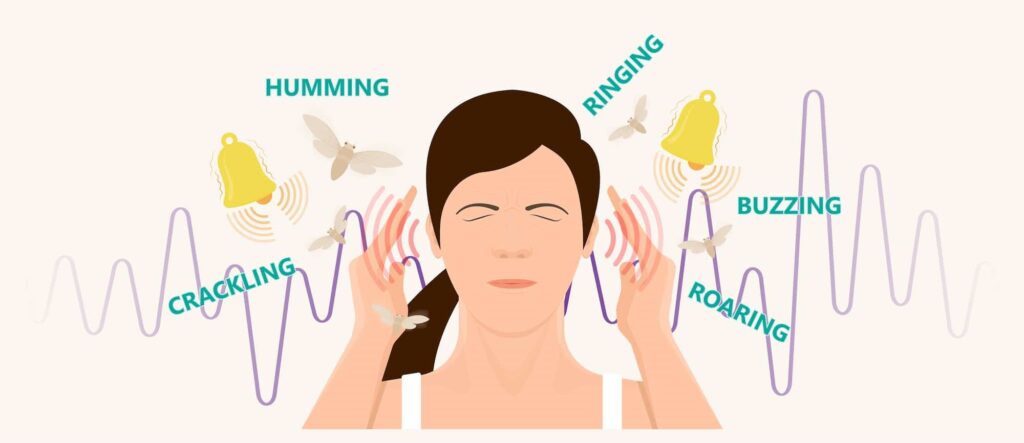Tinnitus is the medical term for “hearing” noises in your ears. It occurs when there is no outside source of the sounds.
Tinnitus is often called “ringing in the ears.” It may also sound like blowing, roaring, buzzing, hissing, humming, whistling, or sizzling. The noises heard can be soft or loud. The person may even think they’re hearing air escaping, water running, the inside of a seashell, or musical notes.
Possible Causes
What is the main cause of tinnitus?
Experts don’t know exactly why some people have ringing in their ears and others don’t. But tinnitus is a common symptom of certain medical conditions.
Common tinnitus causes include:
- Age-related hearing loss. Your brain is used to a certain level of sound stimulation. As a result, your hearing nerve is used to a certain level of activity. When hearing loss occurs, your brain receives less stimulation, but your hearing nerve may still fire at the rate it always has. This can cause you to hear sounds that aren’t really there. About 1 in 3 adults over age 65 develop ringing in their ears.
- Noise-induced hearing loss (NIHL). Exposure to loud noises can cause hearing loss and tinnitus. This can happen over time or from a single incident, like an explosion or close-range gunshot.
- Ear injuries and trauma. These injuries may affect nerves or areas of your brain that help you hear. People who get tinnitus after an injury usually only have ringing in one ear.
- Ear conditions. Earwax blockages or ear infections can cause temporary hearing loss, resulting in ear ringing.
- Medications. Certain drugs can cause tinnitus, including some antibiotics, antidepressants, cancer drugs and nonsteroidal anti-inflammatory drugs (NSAIDs).
Less common tinnitus risk factors include:
- Eustachian tube dysfunction.
- Ménière’s disease.
- Temporomandibular joint (TMJ) disorders.
- Vestibular schwannoma (a noncancerous tumor that forms on the vestibular nerve).
- Otosclerosis (abnormal bone growth inside your ears).
- Blood vessel disorders, which can cause pulsatile tinnitus — a rare form of ear ringing that happens in time with your heartbeat.
- Autoimmune diseases like lupus or rheumatoid arthritis.
People with tinnitus may experience flare-ups after exposure to certain triggers like stress or sleep deprivation. As you can imagine, this can result in a frustrating cycle.
How is tinnitus diagnosed?
Your doctor will take a detailed medical history, including a family history of hearing loss. They will want to know about any medical conditions you may have and any history of infections. Your doctor also needs to know what medicines you’re taking, including herbal products or supplements. They will check your ears. They may give you a hearing test. They may also order other tests to find out what is causing your tinnitus. These could include a head CT scan, a head MRI scan, or blood vessel studies. Your doctor might refer you to an otolaryngologist. This is a doctor that specializes in the ear, nose, and throat (also called an ENT doctor).
Can tinnitus be prevented or avoided?
To prevent tinnitus or keep it from getting worse, avoid long-term exposure to loud noises and activities that put you at risk for hearing loss. If you know you’re going to be around loud noises, take precautions by wearing earplugs or noise-canceling headphones. If you listen to music through headphones, keep the volume low.
If you have tinnitus, avoid things that seem to make it worse. These may include nicotine, alcohol, or caffeine.
Treatment
Treatment will depend on what is causing your tinnitus. If earwax is causing your tinnitus, your doctor will remove it. If a medicine you’re taking is causing the issue, your doctor may recommend you stop taking that medicine. But never stop taking a prescription medicine without talking to your doctor first.
If an underlying condition, such as high blood pressure, is causing your tinnitus, your doctor can create a treatment plan for you to follow. Usually, tinnitus goes away once the condition that is causing it is treated. If diabetes is causing your tinnitus, take your prescribed medicine and follow your doctor’s orders for diet and exercise to manage the condition.
When no specific cause can be identified, your doctor will probably focus on making your tinnitus easier to tolerate. Some possible methods include:
- Hearing aids: For people who have tinnitus and hearing loss, using a hearing aid may be helpful. When you wear a hearing aid, things you need to hear will be louder than the ringing, buzzing, or clicking sound. Hearing aids are available by prescription or over the counter. Talk to your doctor about which is best for you.
- Sound generators (maskers): Wearable sound generators can be placed behind your ear and create white noise (constant background noise) or other sounds. This “masks” the tinnitus and makes it less noticeable. Some people also use bedside sound generators to help them sleep.
- Counseling: Some people who have tinnitus become anxious or depressed because a hearing loss can isolate a person, socially. If you have tinnitus and are struggling, seek help through a counselor and/or a support group to help you cope. Counseling can also be used to help you take the focus off your tinnitus.
- Tinnitus retraining therapy: This method uses a mix of counseling with maskers or other approaches. The goal is to teach your brain to ignore the sounds you hear. This isn’t a quick fix, but many people find it useful with time and practice.
- Relaxing: Stress can make tinnitus worse. Your doctor can suggest relaxation techniques that might help you deal with your stress.
- Medicines: Currently, there are no medicines specifically designed for treating tinnitus. Some medicines, such as certain ones used to treat anxiety, have been shown to relieve tinnitus for some people. Talk to your doctor about whether medicine might relieve your symptoms.


